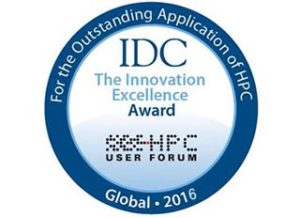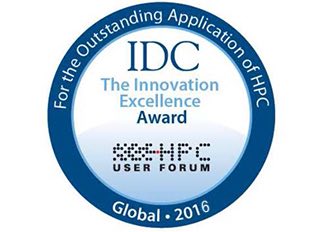 Today IDC today announced the eleventh round of recipients of the HPC Innovation Excellence Award at SC16, the annual worldwide supercomputer industry conference being held this week in Salt Lake City, Utah.
Today IDC today announced the eleventh round of recipients of the HPC Innovation Excellence Award at SC16, the annual worldwide supercomputer industry conference being held this week in Salt Lake City, Utah.
This year’s winners are:
- Gerrit Botha, University of Cape Town, South Africa.
- David Ceperley, University of Illinois at Urbana-Champagne
- Ruby Mendenhall, University of Illinois at Urbana-Champagne
- Leigh Orf, University of Wisconsin at Madison
- Robert Wilhelmson, University of Illinois at Urbana-Champagnechi
They join the elite ranks of the global award program’s more than 70 previous recipients since the program began in 2011.
The HPC Innovation Excellence Award recognizes noteworthy achievements by users of high performance computing technologies. The program’s main goals are to showcase return on investment (ROI) and scientific success stories involving HPC; to help other users better understand the benefits of adopting HPC and justify HPC investments, especially for small and medium-size enterprises (SMEs); to demonstrate the value of HPC to funding bodies and politicians; and to expand public support for increased HPC investments.
Serving as the judging panel for the awards are members of the volunteer steering committee of the HPC User Forum, who represents leading HPC user organizations in government, academia and industry.
IDC research has shown that HPC can greatly accelerate innovation and in many cases can generate return on investment (ROI). We have collected hundreds of quantified examples of the impressive ROI HPC has produced in many research disciplines, industries, and application areas,” said Earl C. Joseph, Ph.D., IDC’s program vice president for High-Performance Computing (HPC) and executive director of the HPC User Forum. “HPC Innovation Award winners represent the most impressive achievements among all the ROI success stories IDC collects. Many of these achievements also directly benefit society.”
HPC Innovation Excellence Award Winners 2016
Robert Wilhelmson and Leigh Orf, University of Wisconsin at Madison: “Unlocking the Mysteries of the Most Violent Tornadoes.” Devastating, long-lived tornadoes are rare, but the death and destruction they cause is significant. This computational project reviewed nearly four years of the researchers’ HPC-based work on this topic, with a strong focus on recent supercell thunderstorm simulations. The researchers presented an overview of the challenges that were overcome in order to simulate and visualize tornadoes, embedded within their parent thunderstorms, at ultra-high spatial and temporal resolution.
David Ceperley, University of Illinois: “Hydrogen under Extreme Conditions.” Hydrogen accounts for much of the visible mass in the universe. The properties of hydrogen and helium are important for understanding large planets. However, experiments under the relevant conditions are challenging. Dr. Ceperley developed new Quantum Monte Carlo simulation methods to treat such systems and has been using them to study molecular dissociation in liquid hydrogen. After validation, the method can be used with more confidence in modeling the wide variety of observed astrophysical objects composed largely of hydrogen and helium under extreme conditions.
Gerrit Botha, University of Cape Town: “Custom Genotyping Chip for African Populations.” This computational project aims to produce genomic variant calls for the design of a cost-effective genotyping chip that will capture the genetic diversity in populations of African origin. This ongoing work will enable the identification of genetic variation specific to African populations, which will improve understanding of the links between genotype and disease in people of African origin, and thus extend the principles of personalized medicine to these underserved populations. Contributers include: Adebowale Adeyemo, Zané Lombard, Nicola Mulder, Victor Jongeneel, Liudmila Mainzer, Gloria Rendon, Ayton Meintjes and Sumir Panji. The chip design was contributed to by a bigger team, including Welcome Trust Sanger institute and University of Witwatersrand. Several data providers within the H3Africa consortium also provided samples for the design.
Ruby Mendenhall et al., University of Illinois: “Rescuing Lost History: Using Big Data to Recover Black Women’s Lived Experiences.” It is often said that history is written by the victors. But it’s probably truer to say it is written by the people who have the opportunity to write. Documents recording the lives of black women are often historically obscure, hidden away in vast library collections and unintentionally misleadingly titled or cataloged. Dr. Mendenhall is leading a collaboration of social scientists, humanities scholars and digital researchers that is harnessing the power of high-performance computing to find and understand the historical experiences of black women by searching two massive databases of written works from the 18th through 20th centuries.
Sign up for our insideHPC Newsletter




